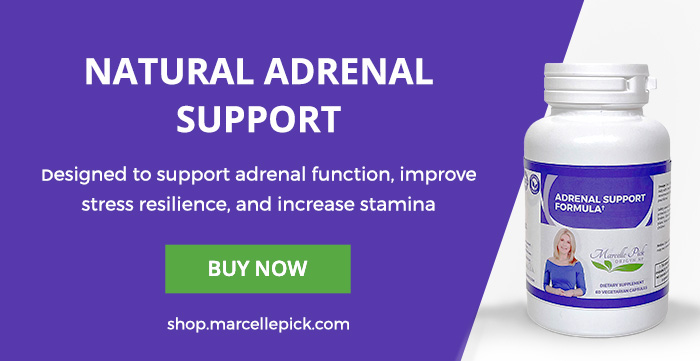Updated: May 25th, 2025
- Chronic stress leads to adrenal dysfunction.
- Stress, both emotional and physical, is ever present in the modern world.
- Imbalanced cortisol levels lead to uncomfortable symptoms, including complete exhaustion.
- Understanding the stages of adrenal fatigue can help avoid total burnout.
- Strategies that address both physical and mental health are crucial to healing adrenal fatigue.
“I have nothing left. I don’t even want to get out of bed most mornings. I had to drag myself here today.” That’s what Sandra said when we talked recently. “I’m just totally exhausted – mentally and physically,” she said.
After we talked a bit, I knew exactly what was likely to be behind her extreme fatigue.
Sandra’s mother was in the early stages of dementia, and had recently moved in with Sandra and her family. The transition had been more than a little rocky, Sandra said. Her mother had been irritable and prone to yelling when things didn’t go the way she expected them to. Sandra’s husband wasn’t coping well with that, and had taken to slamming doors and stony silences.
On top of all that, Sandra’s three children were each struggling in school – both with academic demands and social situations. Her youngest has chronic asthma that required three hospital trips this past winter. And Sandra was trying to support everyone through it all while keeping up with a demanding full time job.
Is it any wonder, then, that she was simply tired out? But the fatigue Sandra described, along with a few other uncomfortable symptoms, told me that her adrenals might be functioning at a less than optimal level. When her lab tests all came back negative, I was even more convinced.
The external stressors that she faced were hard enough on her body, but when I dug a little deeper, I uncovered a lot of stress that Sandra had internalized as well. She felt like she was failing everyone because she couldn’t keep peace in the household. She wondered if she’d been paying attention closely enough, or if her distractedness due to the issues between her mother and husband had made her miss clues that could have saved her child from a hospital trip. And there was a lot of deep, unresolved emotional trauma from her childhood that had been lurking just below the surface since her mother moved in.
All of that stress and trauma added up to one thing in my mind: adrenal fatigue.
How much stress are YOU dealing with?
When I first asked Sandra about stress, she told me about the relationship turmoil and her child’s chronic illness, but never mentioned all the internal emotional issues. That’s because she simply didn’t recognize that all that emotional upset counts as stress too!
Does this sound like you? Have you found yourself exhausted and in chronic pain that doesn’t go away no matter how much you rest your body? Have you begun to realize that physical stress is just one piece of the puzzle?
Even if you’ve heard of adrenal fatigue, you may have no idea how many unresolved problems you have. And if you don’t recognize your stressors, you won’t be able to heal them! Let’s explore what adrenal fatigue is, where it comes from, and the signs that you may be dealing with it. Then I’ll give you 8 concrete strategies for addressing mind and body so you can begin the healing process.
What is Adrenal Fatigue?
Although the term “adrenal fatigue” has caused controversy in the medical community, the set of symptoms caused by imbalanced adrenal function are very real. And they CAN be healed. So instead of debating the validity of the term, know that I’m using it as a way to describe one of the most common symptoms: total and complete fatigue.
To reach that state of utter exhaustion, the problem has likely been going on for quite some time. And it all begins with cortisol.
Cortisol is commonly known as the “stress hormone” because it’s released by the adrenals as part of a healthy stress response. Typically, cortisol levels are higher in the morning, helping you wake up, and gradually decrease as the day wears on. By night time, cortisol levels need to be at their lowest while melatonin is higher in order to promote healthy sleep.
But what happens if your cortisol rhythm is upside down? Or if levels are too high or too low all the time? That’s when the symptoms of adrenal fatigue begin to show up.
And what creates imbalanced cortisol levels? The inability of your adrenal glands to produce or release appropriate amounts of the essential hormone. And that comes from a disconnect in the communication from your brain to the glands.
What causes these mixed signals?
There’s no easy answer to that question, since there are so many factors that can impact adrenal function, and so many places along the hypothalamic-pituitary-adrenal (HPA) axis where something can go wrong. Cortisol is the last in a chain of hormones released, and if anything happens to disrupt the earlier hormones, cortisol levels will suffer.
Some of the most common stressors that lead to adrenal fatigue are viruses, autoimmune conditions, bacterial infections, physical trauma, overexercising, environmental toxins, gut imbalances, food sensitivities, and (often overlooked) emotional stress.
I have numerous articles on the connections between these and other factors in the adrenal health section of my online library. For now, suffice it to say the connections are complex and varied. That’s why it’s so important to know the signs that could point to adrenal fatigue.
Common Symptoms of Adrenal Fatigue
There are several stages of adrenal fatigue, and if you know what to look for you may be able to catch and treat it before you hit the point of complete burnout.
Initially, you may just be experiencing a natural response to acute stress. Your breathing may speed up, your energy increases, and you’re ready to face the stressor head on. This is actually a healthy response, and typically won’t lead to major dysfunction once the emergency has passed. But if the stressors are chronic, as in Sandra’s case, it’s easy to progress to dysfunction. Though symptoms may be very mild, being attentive to whether you feel overly anxious, have trouble sleeping, or experience mild GI discomfort can help you address the problem early.
If you don’t, you may reach stage two, where your brain is sending a constant signal to be alert. Coffee and sugar might become your best friends in this stage as you power through the “tired but wired” feelings. Cortisol production is constant in this phase, but other hormones are slowly beginning to drop as the adrenals focus on releasing enough cortisol. This may result in increased susceptibility to viruses or infection, restlessness and anxiety, and sleep difficulties.
Stage three is when your body is crying out for help. Fatigue begins to set in, and quality of life is impacted in more significant ways. When chronic stress is the norm, all of your body systems struggle. And since your body can’t process one kind of stressor differently than another, it will continue trying to protect you from that stress regardless of actual danger. It puts other functions (including reproduction, digestion and immune function) on hold to focus on making cortisol.
This is when you may feel tired all the time, become irritable and moody, have a drop in libido, trouble with focus, and be unable to get quality sleep. These are the “danger” signs that you’re headed towards a terrible crash.
After a while, your body simply can’t produce that kind of cortisol any longer. While there’s still a little, it’s not enough to carry out normal body functioning. This stage brings constant fatigue, depression and/or anxiety, severe brain fog, and extreme hormonal imbalances. Just getting through a day can seem impossible.
What are some mind body strategies for adrenal health?
When you reach total burnout, it can take months to adequately heal. That’s why I find it so important to talk to women about adrenal fatigue before things get this bad. The following strategies address not only external stress, but also the important internal stress that can’t be ignored. Below are 8 tips to get you started on the path to physical and emotional healing for optimal adrenal function.
1. Put yourself first
It’s okay to say no. Let me say that again: It’s okay to say no. This can be the most important lesson a woman needs to learn in order to keep her adrenal function healthy. You simply can’t do everything that everyone else wants you to do. Remember the old oxygen mask information from airline flights? You can’t help someone else if you don’t first help yourself.
2. Adopt a regular stress relief practice.
When we want to learn or change something, practice is essential. Relieving stress is no different; you must do so intentionally. And you have to actually enjoy the practice, or you’re causing yourself more stress. Yoga, deep breathing, mindfulness, meditation, a walk in the woods, paddling a kayak, dancing…the list of options goes on and on. Make time for something that allows you to release stress every single day — even if it’s just five minutes.
3. Support your body naturally.
Prescriptions aren’t the answer; they simply mask the symptoms but don’t promote actual healing. Plant medicine is a natural way to restore energy that’s been used for healing for centuries. Some effective herbal treatments include Eleuthero (Siberian Ginseng), Astragalus root (A. membranaceus), Cordyceps (C. sinensis), Rhodiola rosea (“golden root”), Licorice root (Glycyrrhiza glabra), and Ashwagandha.
Always check with your health care provider to be sure the herbal treatment you select is right for you. High-quality, natural supplements designed to support adrenal function, like my Adrenal Support Formula, can also be useful when beginning the healing process.
4. Keep moving – gently
Movement is important, regardless of what stage you are in. In the early stages, you can do a little more, but in the late stages it’s best to avoid vigorous exercise. If all you can manage is to walk up and down stairs a couple of times a day, do that to get yourself started. Then slowly increase your walking time, or begin some gentle weight training. Remember – the point of this isn’t to see how hard you can push, so save the high impact cardio class for after you’ve fully healed.
5. Don’t ignore emotional trauma
Good emotional health is essential to proper adrenal function. If you’re hanging on to old hurts, all that stress lingers in your body. I’ve never met a woman yet who didn’t have some emotional trauma leftover from childhood or past relationships. Take steps to address this trauma, either through self-care practices or with professional help (ideally, with a bit of both).
Know your internal stories, and take some time to determine which are true (“I had a difficult childhood”) and which are not (“I’ll never be good enough”). Try to be present in the moment you are living, not the moments gone by. Practice positivity with a gratitude journal, positive affirmations, or surrounding yourself with positive people. Turn off distressing news when you can. Reach out to help others. And above all, find the joy in your life.
6. Eat to promote adrenal health
I often say food is better than any other medicine, and I really believe that’s true. Fresh fruits and vegetables are key to a healthy, balanced diet. Eat at regular intervals to avoid stress on your system, avoid caffeine and sugar when you can, and educate yourself on the best foods for supporting adrenal function.
7. Prioritize quality sleep
Poor sleep is a major stressor on your body. You should strive to get 7-8 hours of sleep every night — more when healing from adrenal dysfunction. I know that’s hard to do when your mind is racing and you can’t relax. That’s why it’s so important to create a restful bedtime routine, without electronics, to help you wind down and prepare for quality sleep. Low lighting, soft music, and a soothing cup of tea can also help. And if sleeping at night eludes you at times, don’t underestimate the value of a quick power nap in the middle of the day.
8. Practice gratitude
Adopting a gratitude practice goes hand-in-hand with practicing mindfulness, but it may be one of the most powerful tools we have. I recently told the incredible story of Valerie, a woman who went from being completely bed-bound to climbing mountains, in large part thanks to her commitment to gratitude. Consider keeping a gratitude journal, or simply taking a few moments every morning or evening to reflect on what you’re thankful for.
Address stress: your adrenal glands will thank you
Sandra is at the beginning of her journey. She has a long way to go, and there’s no way to rush healing. But she’s tried some of the strategies I recommended, and she was happy to report that after just a few weeks she already felt much better. She could get out of bed more easily, and as long as she was careful about not pushing too hard, she could make it all the way to bedtime without a nap.
It wasn’t easy to put herself first in order to heal. She had to do some hard work to set clear boundaries in the household, give herself permission to take time for herself, and spend some time addressing (and releasing) the emotional burden she’d carried for far too long. As difficult as it was, Sandra told me, it was entirely worth it!









